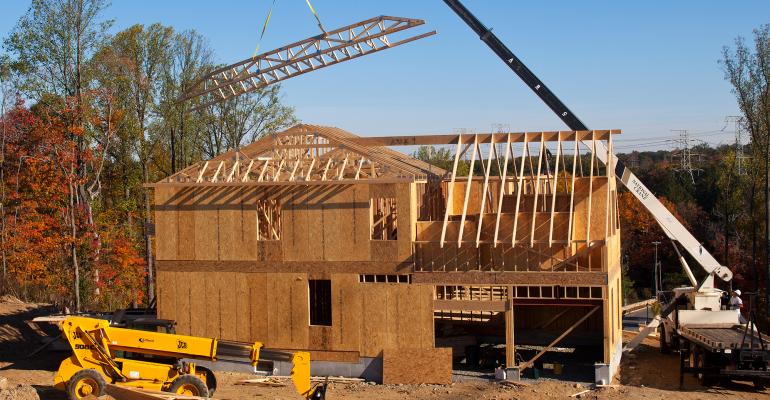(Bloomberg)—U.S. housing starts decreased in September, driven by a pullback in multifamily construction, as lingering supply-chain constraints, shortages of skilled labor and elevated materials costs continue to challenge builders.
Residential starts fell 1.6% last month to a 1.56 million annualized rate, according to government data released Tuesday. The median estimate in a Bloomberg survey called for a 1.62 million pace.
Applications to build, a proxy for future construction, fell 7.7% to an annualized 1.59 million units in September, the largest monthly decline since February. The drop was driven by a sharp decrease in multifamily permits.
Cheap borrowing costs and a pandemic-fueled migration to the suburbs supported housing demand and construction through late 2020 and earlier this year. But high materials costs, unpredictable supply-chain delays and labor shortages have strained builders’ ability to keep up with still-solid demand in more recent months.
Single-family starts were unchanged in September at an annualized 1.08 million units as multifamily starts -- which tend to be volatile and include apartment buildings and condominiums -- decreased 5% to 475,000.
Meanwhile, the report indicates builders are making little headway on project backlogs. The number of single-family homes authorized for construction but not yet started -- a measure of backlogs -- edged lower to 144,000 in September but remains near a 15-year high.
While high construction costs helped fuel a surge in prices that has cooled buyer interest somewhat, builders remain generally optimistic. A gauge of homebuilder sentiment rose to a three-month high in October -- holding well-above pre-pandemic levels -- a separate report showed Monday.
The report also showed the number of homes under construction but not yet completed rose to the highest since 1974. Regionally, residential starts fell in two of four regions, led by a 27.3% drop in the Northeast. Starts rose in the Midwest and West.
--With assistance from Chris Middleton and Olivia Rockeman.
© 2021 Bloomberg L.P.





